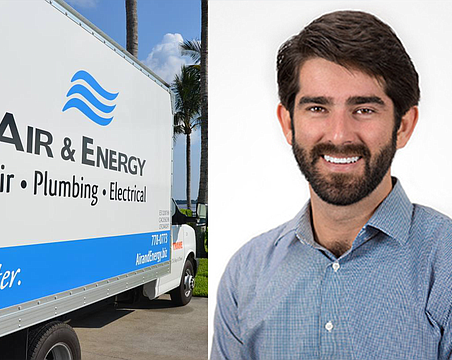REVIEW SUMMARY
Business. Oliphant Financial, Lakewood Ranch
Industry. Debt-buying, finance
Key. Company balances risk with reward in attempting to seize upon growth opportunities.
Bob Morris might want to trade his beloved elephant for a gazelle.
That's because the personal debt collection firm Morris founded in 1992, Oliphant Financial, could soon become one of the fastest growing companies on the Gulf Coast. In fact, Morris says if several “ifs” turn into reality, the $2 million business could quadruple its annual revenues this year.
The gazelle-like growth is already underway.
For starters, late last year the then 30-employee company moved out of its 7,500-square-foot digs in downtown Sarasota for office space in east Manatee County nearly three times bigger. Oliphant, with an elephant for a corporate logo, has since hired about 15 people and plans to hire at least 100 more in the next six months.
Manatee County economic development officials seized on the opportunity to lock Oliphant into the area earlier this year by signing a five-year jobs grant agreement with the firm for $133,000. The county will pay Oliphant that amount if it hires and retains at least 133 people with a combined annual average salary higher than the county's current yearly average salary of $33,582.
And here's the linchpin to the projected growth: Oliphant is working with a deep-pocketed hedge fund in New York that Morris says will invest up to $100 million if and when the right debt portfolio purchase opportunity presents itself. Those types of purchases are what will require the company to hire a small army of debt collectors.
“We expect quite a lot of debt collection volume to hit the market this year,” says Morris. “Not many banks want to lend money to a company that purchases bed debt, especially in this economy.”
Morris, who is considered something of a national leader in the consumer debt collection business, says the timing of the potential growth is somewhat obvious. The recession has forced millions of people into debt, the most in a generation by some estimates. That in turn means that the personal consumer debt pools being sold by credit card companies, banks and other financial firms has grown dramatically.
Of course, the risk is also heightened in buying larger — and more expensive — debt pools because the return is less known.
Says Morris: “It's a careful dance between reality and what we think can pull off.”
Regulations and research
Furthermore, a conflict lingers within the company's strategy that threatens to derail the growth projections.
On the one hand there is a sense of urgency inside Oliphant to act fast on potential debt pool purchases. “We are in a very competitive situation with other debt buyers,” says Tom Noble, the company's chief operating officer.
But Oliphant wants to simultaneously proceed with caution, hence the conflict. It must take into account a myriad of possibilities when buying a pool of debt. That goes from what actions the federal government has or might take to regulate the industry to consumer spending habits to making sure it has the right software to analyze and manage the risk.
The regulatory threat is a legitimate concern. Indeed, a federal financial reform bill proposed by Sen. Chris Dodd, D-Conn., calls for a new agency within the Federal Reserve to oversee debt-buying firms such as Oliphant. The Federal Trade Commission currently oversees the industry.
Most debt-buying industry lobbyists and executives are against the change, saying it would be inefficient and create uncertainty in an already heavily regulated marketplace. “I'd rather be under the FTC,” says Morris, the co-founder and onetime president of Debt Buyers Association International, a leading industry trade group.
The fact that each state has its own regulatory policies and license requirements only adds to the complications.
Just as important as the regulatory watch, however, is Oliphant's internal approach to buying debt. That begins with a keen focus on technology, which includes using proprietary software the company created to analyze the market and risks.
“We have to have a better tool than our competitors,” says Noble. “The last thing you want to do is pay 50 cents on the dollar for something that is worth 30 cents.”
Morris points out another challenge in that vein: It turns out the minutiae of a debt pool purchase is really something not to be overlooked. That's because the specifics of each delinquent account can go a long way toward determining overall collection success.
“The language can be misleading,” says Morris. “You have to ask the right questions [because] it's what you don't know that can hurt you.”
Adds Morris: “We have made a lot of mistakes and it could take two years to know you've made a mistake.”
Since Morris founded Oliphant in the early 1990s it has bought more than 350 portfolios that range from $10 million in debt to more than $500 million. It recently closed on a deal to buy a portfolio of $518 million in consumer debt from a competitor in California that filed for bankruptcy.
Debt portfolios are traditionally bid on by a group of companies like Oliphant. Packages with newer accounts, ones that are deemed easier to collect, usually sell for about five or 10 cents on the dollar. Older portfolios, which require more time and effort to collect, go for less than a penny to four cents on the dollar.
A white knight
Once Oliphant wins a portfolio, the company turns to what Morris calls the art of collection. That's when its collection agents hit the phones to work out deals with debtors.
This side of the industry is heavily regulated, governed by a bevy of state and federal privacy and anti-harassment laws. It's also the side that Morris admits sometimes brings out the underbelly of the industry, where people develop a bad reputation for debt collectors.
Morris, however, says it has paid off for Oliphant to try to play the role of 'good cop' in the debt collection game. Oliphant collection agents have a bottom number they will accept in payment on each account and they can negotiate a settlement with the debtor based on that number.
“We pride ourselves on being the white knight of the industry,” says Morris.
That helps because Oliphant usually competes with other debt collection firms and agencies when it goes after individual accounts. That's because the typical debtor owes money to more than once source.
“We try to have an air of positive thoughts when we collect,” says Morris. “We want them to think of us first when they start repaying their debt.”
About 25 of the company's 45 employees work the collection phones, says Morris, a percentage of collectors to total employees likely to rise if the company wins more debt portfolio bids. Some of the employees are paid on commission, a percentage of what they can collect, while others are paid on straight salary.
All the collectors at Oliphant, says Morris, go through an extensive education process before going live. Says Morris: “There's a ton of training before anyone touches the phones.”
'Cultural fit'
Given all of these risks, it isn't a surprise that Morris says the trick to buying debt portfolios right is to combine unimpeachable research with impeccable timing. “Modeling and analysis is a big part of what we do here everyday,” Morris says.
And now another big part of the company's daily operations will be to manage the rapid growth that stems from having more debt to collect. The announced jobs combined with high-unemployment rates have meant more applications. But the hiring standards, says Morris, are still stringent.
“We are trying to grow the right way,” says Morris. “The cultural fit is very important to us.”
The new hires include a first-ever chief financial officer. Morris had been doing some of that work himself and he can now focus on bigger picture projects.
Moreover, Oliphant took care of the physical part of managing growth in late 2009, when it leased new office space in a Lakewood Ranch corporate park just east of Interstate 75. The space previously housed the offices of Circle L Roofing.
The new office is a windy maze of cubicles — a much different look than 1992, when Morris founded Oliphant with help from his wife and sister, in addition to a small loan from his father. At that time the company had to build a database of contacts from scratch and develop a reputable image in the then budding debt-buying industry.
Morris, who worked in insurance sales for a few years before Oliphant, says the early 1990s were good times in the sense that there was little competition. Plus, in the early days the industry wasn't heavily regulated, nor did it have a bad reputation.
“Nobody really knew it was an industry back then,” says Morris. “But we always hoped it would grow.”






